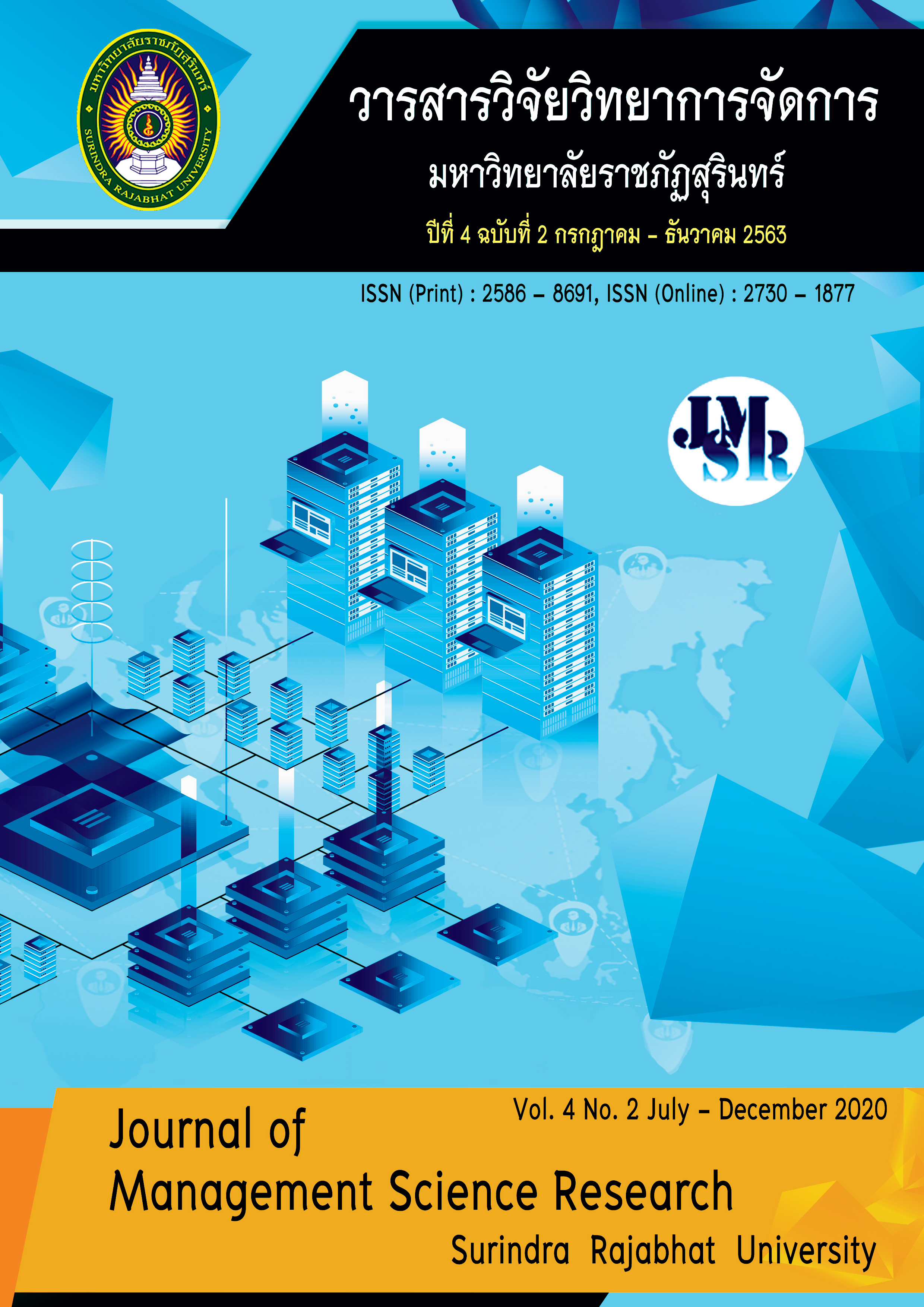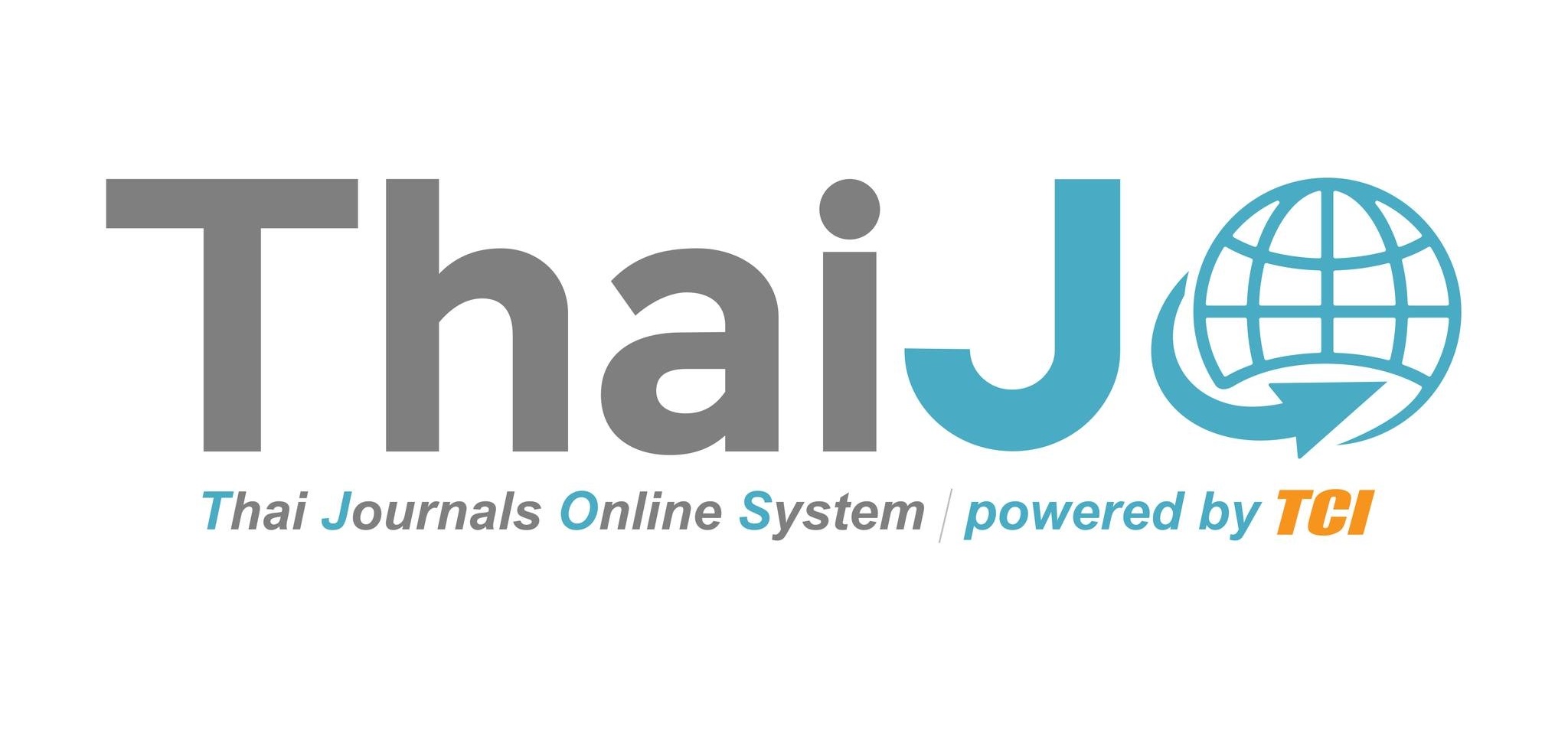Factors Affecting Employee Engagement : A Case Study of Ice Manufacturing Corporate Group in Ubon Ratchathani Province
Keywords:
Employee Engagement, Motivation, Work Environment, Career OpportunitiesAbstract
This study aimed to (1) compare personal factors, which are gender, age, education, marital status, average monthly income, duration of employment and position, affecting employee engagement, (2) study the relationship between motivation and employee engagement and (3) study the influence of motivation on employee engagement. The sample consisted of 288 employees in an ice manufacturing corporate group in Ubon Ratchathani province using Taro Yamane method for sample size calculation and probability sampling techniques. A questionnaire was an instrument for collecting data. Data analysis was conducted using frequency, percentage, mean, standard deviation, independent two sample t – test, the Analysis of Variance (ANOVA), Pearson’s Correlation Analysis and Multiple Regression Analysis. The results revealed that (1) personal factors; education, average monthly income, duration of employment and position significantly affected employee engagement, but gender, age and marital status did not affect employee engagement, (2) motivational factors; leadership, benefits, work environment, career opportunities and learning and development were significantly and positively related to employee engagement and (3) motivational factors; work environment and career opportunities significantly affected employee engagement, but leadership, benefits and learning and development did not affect employee engagement.
References
กัลยารัตน์ ธีระธนชัยกุล. (2557). การบริหารทรัพยากรมนุษย์. กรุงเทพฯ : ส. เอเซียเพรส (1989).
ฐิติมา หลักทอง. (2557). ความผูกพันต่อองค์กรของพนักงานบริษัท ผลิตชิ้นส่วนอุตสาหกรรมยานยนต์แห่งหนึ่ง ในนิคมอุตสาหกรรมอมตะนคร จังหวัดชลบุรี. งานนิพนธ์รัฐประศาสนศาสตรมหาบัณฑิต. มหาวิทยาลัยบูรพา.
ณฐพรรณ ชาญธัญกรรม. (2561). ปัจจัยที่ส่งผลต่อความผูกพันต่อองค์การของบุคลากรกรมชลประทาน (สามเสน). การค้นคว้าอิสระบริหารธุรกิจมหาบัณฑิต. มหาวิทยาลัยเกริก.
ธานินทร์ ศิลป์จารุ. (2560). การวิจัยและวิเคราะห์ข้อมูลทางสถิติด้วย SPSS และ AMOS. (พิมพ์ครั้งที่ 17). นนทบุรี : เอส. อาร์. พริ้นติ้ง แมสโปรดักส์.
ปกภณ จันทศาสตร์. (2559). ปัจจัยคุณสมบัติส่วนบุคคล ปัจจัยด้านลักษณะงาน และแรงจูงใจที่มีผลต่อความผูกพันกับองค์กรของพนักงานเอกชนระดับปฏิบัติการ ในเขตลาดพร้าว-จตุจักร. การค้นคว้าอิสระบริหารธุรกิจมหาบัณฑิต. มหาวิทยาลัยกรุงเทพ.
ปาริชาติ บัวเป็ง. (2554). ปัจจัยที่มีผลต่อความผูกพันต่อองค์กรของพนักงาน บริษัท ไดกิ้น อินดัสทรีส์ ประเทศไทย (จำกัด). การค้นคว้าอิสระบริหารธุรกิจมหาบัณฑิต. มหาวิทยาลัยเทคโนโลยีราชมงคลธัญบุรี.
พัสราพรรณ เพ็ชร์ยาหน. (2557). ความสัมพันธ์ระหว่างแรงจูงใจในการทำงานกับความผูกพันต่อองค์กร กรณีศึกษา ธนาคาร กรุงไทย จำกัด (มหาชน) ในเขตพื้นที่กรุงเทพมหานคร. วิทยานิพนธ์บริหารธุรกิจมหาบัณฑิต. มหาวิทยาลัยศิลปากร.
พิรินทร์ชา สมานสินธุ์. (2554). การศึกษาปัจจัยที่มีอิทธิพลต่อการสร้างความผูกพันของพนักงาน : ศึกษาเฉพาะกรณี บริษัท เบสท์ เพอฟอร์แมนซ์ เอ็นจิเนียริ่ง จำกัด. การค้นคว้าอิสระบริหารธุรกิจมหาบัณฑิต. มหาวิทยาลัยหอการค้าไทย.
รักษ์รัศมี วุฒิมานพ. (2555). ลักษณะบุคคลและลักษณะงานที่มีความสัมพันธ์กับความผูกพันต่อองค์กรของพนักงาน. สารนิพนธ์บริหารธุรกิจมหาบัณฑิต. มหาวิทยาลัยศรีนครินทรวิโรฒ.
วธู สวนานนท์. (2561). ความสัมพันธ์ระหว่างลักษณะงาน คุณภาพชีวิตในการงาน และความผูกพันของพนักงานต่อองค์การรัฐวิสาหกิจแห่งหนึ่ง. งานวิจัยส่วนบุคคลศิลปศาสตรมหาบัณฑิต. มหาวิทยาลัยธรรมศาสตร์.
สุธีรา อะทะวงษา. (2560). การจัดการธุรกิจขนาดกลางและขนาดย่อม. เชียงใหม่ : เชียงใหม่โรงพิมพ์แสงศิลป์.
สำนักงานแรงงานจังหวัดอุบลราชธานี. (2560). รายงานการวิเคราะห์ข้อมูลอุปสงค์และอุปทานแรงงาน จังหวัดอุบลราชธานี ปี 2560 [ออนไลน์]. ค้นเมื่อ 1 มีนาคม 2561, จาก http://ubonratchathani.mol.go.th/ download.
Anitha, J. (2014). Determinants of Employee Engagement and Their Impact on Employee Performance. International Journal of Productivity and Performance Management, 63(3), 308 - 323.
Bakar, R. A. (2013). Understanding Factors Influencing Employee Engagement: A Study of the Financial Sector in Malaysia. Doctor of Philosophy’s Thesis. RMIT University.
Bersin, J. (2015). Becoming Irresistible : A New Model for Employee Engagement. Deloitte Review, 16, 146 – 163.
Liyanage, H. M. and Gamage, P. (2017). Factors Influencing the Employee Engagement of the Generation Y Employees. In APIIT Business and Technology Conference, July 20th, 2017. 66 - 77. Colombo : APIIT City Campus.
Mohd I. H., Shah M. M., Zailan, N. S. (2016). How Working Environment Affects the Employee Engagement in a Telecommunication Company. In the 3rd International Conference on Business and Economics, September, 21st – 23rd, 2016. 418 - 426. Selangor Darul Ehsan : Universiti Teknologi MARA.
Stair M. and Galpin M. (2010). Positive Engagement : From Employee Engagement to Workplace Happiness. In Oxford Handbook of Positive Psychology and Work, Linley, P. A., Harrington, S., Garcea N., Editor. New York : Oxford University Press. 155 – 172.







